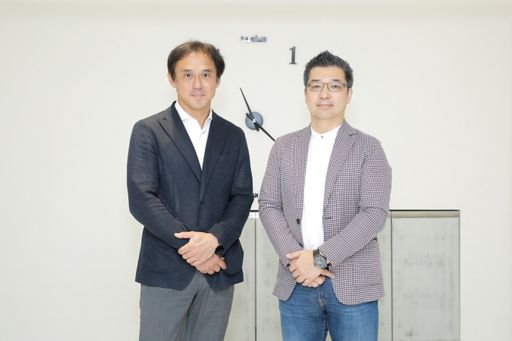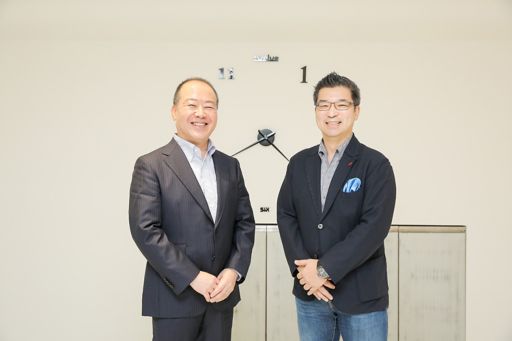Since the spread of COVID-19, major companies in particular have started to focus their attention on “philosophy-based management.” Also, an increasing number of people are becoming resolved to start small businesses in this age of growing uncertainty. Meanwhile, as you already know, digitalization and technology have been rapidly permeating our lives in recent years. These two events are not occurring in different world lines but are connected without doubt. So, what kind of society lies in store in the future?
In this article, we will introduce the discussions conducted between Shinya Nakayama, Principal, Rakuten University, Rakuten Group, Inc., and Masayuki Chatani from KPMG Ignition Tokyo. They take a quick overview of how technology and the awareness to accept technology are revolutionizing how we live and work, how we find value and how an organization should be while also envisioning and fantasizing what kind of society awaits us in the post-COVID-19 age.
Contents
- Significance of Platformers Offering Learning Opportunities Themselves
- “Flow Theory” for Increasing Grown-ups who Work with Passion
- Misconception of Team Building: “That is Not Team Building but Division of Labor”
- Isn’t the Management Creating a Dependent Structure?
- “Philosophy” Indicates a Line that Cannot be Crossed
- Unravelling “What DX Is” for SMEs
- Process of Ordinary Eyeglass Store Transforming into “Fighting Eyeglass Store” -Example of Transformation of an SME-
- Profile of Interviewee
Significance of Platformers Offering Learning Opportunities Themselves

(Shinya Nakayama, Principal of Rakuten University, Rakuten Group, Inc. and CEO of Nakayama Kozai Co., Ltd. (left), Masayuki Chatani, Representative Director & CEO of KPMG Ignition Tokyo and CDO of KPMG Japan (right)) *Professional affiliation and official position in the article are at the time of publication.
Chatani: Our relationship goes back to when I was working for Rakuten. I have various questions I would like to ask you today.
You are one of the so-called initial members of Rakuten who joined the company when it was still located in Yutenji and worked as an EC (electronic commerce) Consultant. Becoming the Principal of Rakuten University after being an EC Consultant is quite an interesting career record. In the first place, I have also been interested in the concept of “Rakuten University,” which is to “encourage merchants to become ‘self-directed’.”
Today, it is no longer uncommon for platformers themselves to set up training establishments to develop human resources who can skillfully utilize their services but this must have been epoch-making in 2000, when “Rakuten University” was established. While the situation differs between now and then, what do you think is the significance of platformers launching a training establishment?
Nakayama: The concept of “Rakuten University” has not changed since the beginning. As you mentioned earlier, I joined Rakuten in 1999 and became the first EC consultant of Rakuten Ichiba.
Soon afterward, we encountered a situation where we were unable to provide sufficient support because the number of stores continued to increase while recruitment lagged behind and the number of stores covered by one employee kept on increasing.
One day (in 2000), Hiroshi Mikitani, our CEO, spoke to us and said the following. “Our company is currently growing rapidly. We owe our growth not only to our 100 or so (at the time) employees who are working hard by even cutting back their sleeping hours but also to the output of the 2,500 merchants who create content and communicate with customers. In other words, the key to the growth of Rakuten lies in the performances of the merchants. What is important, more than anything else, is to increase the number of merchants that can think and act actively on their own.”
We started to internally express his words as “increasing the number of self-directed merchants.” Rakuten had adopted the slogan “empowerment” since its establishment in 1997 but a shared awareness that “increasing the number of self-directed merchants is indeed empowerment” emerged.
Though its shape may have changed somewhat with the trend of the times, our basic concept is that Rakuten’s business is a shopping mall style business and not a direct-sales model. This is why our way of thinking, “Rakuten empowers merchants,” remains unchanged.
Chatani: Yes, I have noticed that the word empowerment is used beyond the framework of Rakuten Ichiba and in the activities of the entire group. Recently, I have also seen the word empowerment used as one of the axes of Rakuten, especially when it collaborates with local governments or participates in sports promotion events.
“Flow Theory” for Increasing Grown-ups who Work with Passion
Chatani: You are an employee of Rakuten and the Principal of Rakuten University. At the same time, you are managing your own company as well. Moreover, I hear that you are also providing training programs to coaches and junior players under a professional contract with the professional football club Yokohama F. Marinos, and that you are an “air (online) employee” of YO-HO Brewing Company, which is famous for its craft beer “Yona Yona Ale.” As I listen to your stories and read your books, it seems that not only the key word “self-directed” but also ”free” appear everywhere.
For instance, you are free to have multiple occupations, can freely attend work as necessary and can choose the type of work freely. This working style has probably resulted in your book, “Working Freely while Belonging to an Organization. Job Insecurity Changes to ‘Passion’—‘The Law of Addition, Subtraction, Multiplication and Division (+-×÷)’ (JMA Management Center).” The book is very interesting. I felt nostalgic when the term “flow theory” appeared at the beginning.
Flow Theory
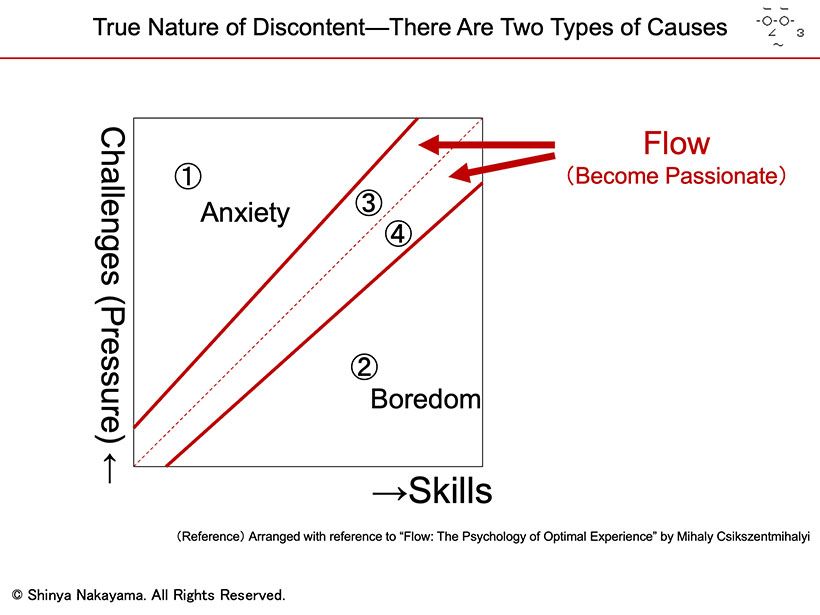
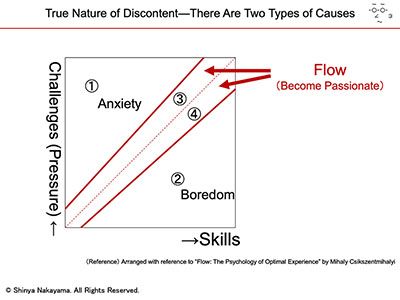
That’s because when I was working at Sony, I was working under Toshitada Doi, who was in charge of developing robots such as AIBO and QRIO. He used to give a monthly lecture where he always talked about the flow theory of Mihaly Csikszentmihalyi. I was filled with a nostalgic feeling when I read about the “flow theory” in your book after a long time.
I seem to have talked a little too much. How do you think the “flow theory” is important in how we work?
Nakayama: Well, I have my own philosophy, which is “to increase the number of grown-ups who are passionate about their work and are admired by children.” Children write about their future dreams in their elementary school graduation essays, for instance, “I will be like Shohei Otani” or “I want to be like Messi.” I think this is because the only grown-ups who seem to be enjoying their work are those who appear in the media such as athletes, TV personalities and, recently, YouTubers.
That being the case, I am hoping to support many merchants at Rakuten University and increase the number of merchants who are enjoying their work, whether it is a real store or EC, throughout the country and create an environment where children can watch them at close hand. I hope that a world can be created where there is an increase in the number of children who write “I want to be like that flower shop manager” or “I want to be like the owner of that fish store” as their future dreams in their graduation essays.
When I was thinking about these things, I learned that “people tend to become passionate when they are at a well-balanced coordinate between the vertical axis, which shows the level of challenges, and the horizontal axis, which shows their skills” in the “flow theory.” That was very convincing and I was so impressed that I said, “This is it!!”
The reason why I felt so excited was because when I was in elementary school, I used to meet with friends at the park or schoolyard after school and I was always playing football by breaking into two teams. As it was a game played by elementary school children, there was no set meeting time and the children left whenever they had to go home.
So, the number of players of the two teams eventually became uneven and the children in the losing team became demotivated and sometimes collapsed on the ground and just lay there. We then changed the members of the teams and if the teams consisted of five vs. four members, for example, we adjusted the rules to give an advantage to the team with fewer members. It came back to me that we used to do this from when we were children.
When I saw the “flow theory” chart, I felt that I would be able to explain everything with this based on my experience from my childhood. I was even able to look back and understand my past behavior, such as doing a lot of thinking and trying to approach the “flow” zone when I was in “anxiety” or “boredom” zones and devising ways to try to stay within the “flow” zone.
Chatani: I see. The first thing I was told when I was sent to study abroad from Sony was “to enjoy myself even if I had to borrow money.” In other words, to broaden my knowledge in various fields including outside my specialty.
By the way, Sony was a very free company. For instance, I was told by another manager, “You should take your sneakers and bathing suit when you go on a business trip.”
Reading about the flow theory, I feel that Sony indeed used to be a “flow organization” at the beginning. Though this is not always possible when the scale of the company becomes bigger, I imagine that Rakuten also had an environment where one could feel a “sense of collective flow” when you joined the company and were establishing Rakuten University.
Nakayama: You’re quite right.
Chatani: One more story about Mr. Doi. He was an engineer at Sony who became the youngest board member, except for the founding generation, when he was 42 and then advanced to senior managing director. One day, he held his own funeral while he was still alive and started to refer to himself as Shiro Tenge, which he had been using as a pen name. He is the author of “Start Looking for Personnel Beginning with ‘Misfit Employees’: Secret of ‘Passionate Group’ that Creates Miracles (Published by Kodansha)”
Nakayama: That’s my favorite book!
Chatani: The “misfit employee” who appears in the book was an employee who was 4-5 years my senior and worked next to me.
Everyone was very interesting and when I was having trouble with work, someone from a completely different division would stroll in and give me advice as a mentor, saying, “It might be better to do it this way.” There was even a person who suggested to my superior, “it would be very interesting if you bring it together with that of that division!” It was a group of people who acted not for the sake of profits but based on whether something was interesting or not.
It can be said that they functioned as an “agent” that initiates chemical reactions within an organization like bees. Such a presence is extremely important and I think that Mr. Doi said “look for personnel beginning with misfit employees” because he understood their importance.
Misconception of Team Building: “That is Not Team Building but Division of Labor”
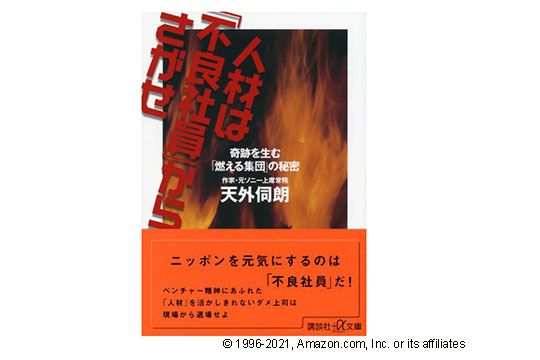
Chatani: I confirmed what we have in common. We both experienced a “flow organization,” you at Rakuten and me at Sony, and how enjoyable it is. You are now working actively to spread this, such as holding team-building seminars and workshops.
As “visionary management” has recently been drawing attention and the importance of building and managing teams and creating philosophies is being talked about, you must receive many requests for seminars. Is there anything you struggle with on these occasions?
Nakayama: What’s difficult is that everyone says that they “want to create a team” but what they want to create is not a team but “an organization that follows their instructions and delivers an outcome that they want to achieve.”
As team building for me is to create a situation and environment where one can enter a collective flow, our images are quite different. So, I have a hard time trying to reconcile this gap.
The biggest mistake in team building is to ask, “I want to control my organization skillfully. What should I do?”
This is because, in the process of building a team, it is important to let go of control of it. Shiro Tenge talks about “letting go of various things” in his book but the process of “getting into an uncontrollable chaotic state with everyone talking ‘yackety-yak’ at the same time, from which adjustments are made and relevant rules and role allotments are eventually generated” is very important for becoming a team. The question of “wanting to exert control” is wrong.
Chatani: This means that one must start out by correcting the problem setting, as things will not go well if the problem setting is wrong,
Nakayama: That’s right. “To build a team” and “do well by continuing to divide work” is a different thing. If performance is declining because the conventional division of labor style does not function anymore, then unless the division of labor style can be revised fundamentally, it will be like simply prolonging the life of an out-of-date organization.
As work is divided in the division of labor, it is difficult for the members to grasp the entire picture when the organization becomes large and they are no longer able to understand the meaning of their jobs. Even if they want to think and act on their own, they are unable to do so if they cannot break the division of labor. Therefore, they cannot become a self-directed organization or personnel.
Isn’t the Management Creating a Dependent Structure?
Chatani: There are probably many cases where people are unable to become self-directed even if they are told to do whatever they like freely. What do you think is the reason for this?
Nakayama: I think the major reason is their dependency.
Chatani: Do you mean that each member is dependent?
Nakayama: If an organization is employing a management method that controls the members, it is easier to control them if they are dependent. It is therefore natural that as a result, the members become dependent. So, what I call a “team” is an image of a different operating system, or OS, of an organization.
Chatani: I see. As “OS” is a somewhat technical expression, let me think of some examples. What just came to my mind is sports. For instance, the OS of baseball and that of football are quite different.
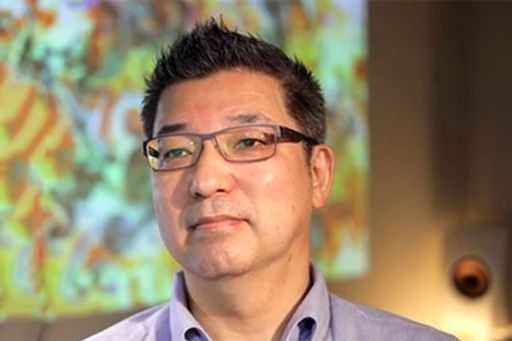
While baseball players confirm the sign of the coach for each ball, football players sometimes need to make decisions themselves. In this sense, the management style of football seems more laissez-faire than that of baseball and so baseball and football seem to have a different OS. When I hear the word “team,” I imagine a baseball-type OS because I used to play baseball, but do you imagine a football-type OS?
Nakayama: In terms of baseball and football, we tend to think that the baseball OS is a direction/supervision type and the football OS is a self-directed type, but I feel that there are many football coaches with a baseball-type OS.
Chatani: Can they function well?
Nakayama: It’s rather easier to win that way. However, there is no giant-killing with this type because they cannot generate an outcome that exceeds the answers that can be provided by the coach. Whether it is football or business, I feel that there are many people with the mind of a baseball OS in the current management of Japanese companies, as they are the generation that had the most opportunity to play baseball when they were children or watch night games of baseball on TV.
That’s why they talk about “football-type personnel” but tend to manage by “making people listen to them.” By the way, there is a common episode among people who “used to play baseball before” among those I have come to know well based on the keywords “self-directed organization and personnel,” which is that “they have the experience of being yelled at for ignoring the coach’s sign to do a bunt” (laughs).
“Philosophy” Indicates a Line that Cannot be Crossed

Chatani: We talked about the OS of management but I felt that awareness of governance is different depending on whether the person has a baseball-type OS and acts based on the premise that “the coach provides directions/supervision and the players move accordingly” or a football-type OS based on the premise that “you must think and act for yourself according to the situation.” What do you think?
Nakayama: Well, I think that it is important to clearly indicate “what should not be done” in advance and specify rules such as “it’s OK to do anything within this scope” to people who act based on a football-type OS. It’s like the out-of-bounds, or OB line, in golf.
I think that there are many direction-type or one correct-answer-type rules that require “everyone to do the same thing” because deciding on OB line-type rules is quite costly to think about. On a side note, a “good philosophy” serves as an OB line. For instance, the philosophy of Rakuten is “empowerment” and we can act freely within this scope.
In the case of Rakuten Ichiba, to enable “all the merchants to be self-directed and operate a good business that pleases customers” is empowerment. Therefore, they can take actions without the approval of their superiors and will not be yelled at if they do not go beyond this scope.
If we look at things from a different perspective, I think that a philosophy is a constraint but in the case of Rakuten Ichiba, it means “please increase your sales but this must be done in a way that leads to empowerment, otherwise, we will not acknowledge them as sales.”
Going back to the example of football, there is a foul called “handball.” I think that a philosophy is similar to this “handball.” Football players practice hard to refine their foot techniques because they are “not allowed to use their hands” and the attractiveness of football is that shots are missed frequently because it is not as easy as handling the ball with your hands. We become really excited when a goal is finally scored because it is so difficult.
If we replace this with a company, it is not interesting at all if someone is generating sales by doing something that is equivalent to a “handball.” In the case of Rakuten Ichiba, we should not increase our sales by increasing the number of merchants that depend on discount sales. We can easily create a distribution channel by selling at discount prices but as this does not lead to empowerment, it is referred to as a “foul” because it is the same as scoring a goal with your hand.
Chatani: That’s interesting. That is a very important viewpoint.
Unravelling “What DX Is” for SMEs
Chatani: When Rakuten Ichiba started, I imagine that it was a place where small businesses like downtown stores could open their shops. I think that it played an important role in providing an opportunity for them to set foot in the digital world of EC.
I would like to ask you how you see the relationship between small businesses and digital technology. In recent years, especially, the “promotion of DX (Digital Transformation)” has been advocated regardless of the scale of companies. I’m keen to know how you view this situation.
Nakayama: An acquaintance is operating a school for SME (Small and medium-sized enterprise) owners where I have a team-building class. When I received this request, I was asked: “Is there anyone who can talk on themes like DX and IT for SMEs? When it comes to SMEs and not major companies, I can’t think of anyone…” I spontaneously said, “that’s me.” This is how I came to be in charge of the “not too exaggerated DX and IT” class.
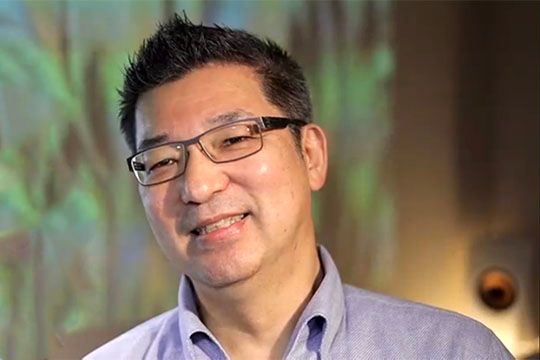
I have seen many Rakuten merchants transform their business. They have a growth pattern. They first start by “selling products that are sold at a physical store through the internet.” When this gets on track and they get closer to their customers, the product lineup starts to change gradually.
It may be easier to understand this if you imagine a downtown bookstore. If they were to start an EC business, they would start by registering the books they sell in their store. However, the lineups of downtown bookstores are all similar anywhere in the country. As real stores need to select products that will sell to customers living within a radius of several kilometers, they cannot help but offer best sellers.
If the EC sites of all bookstores offer the same books, customers will “end up buying them at Amazon” because there is no price competition for books. Even if they are not books but price-competitive products, only stores that sell them at the lowest price will be in demand.
On the other hand, if the merchants realize that “a business based on products that only sell to one out of 10,000 people is impossible with real stores but possible with online shops,” they start to transform and enter the growth phase.
For example, have you ever seen a “specialized store for new baby gifts” in rural areas? In fact, there is a merchant in Kagoshima specializing in new baby gifts that has opened a shop in Rakuten Ichiba but I think this concept is possible only because of the internet, which allows us to deal with people from all over Japan.
Process of Ordinary Eyeglass Store Transforming into “Fighting Eyeglass Store”. -Example of Transformation of an SME-

Nakayama: There is another good example of “DX” of SMEs, which is an eyeglass store in Gifu. The store was selling eyeglasses through an internet shop in a normal way but one day, the owner was invited by a friend to participate in a survival game and he became hooked on it. After participating in the game several times, he noticed that while everyone was wearing eyeglasses to protect their eyes, there was no one who was selecting or handling eyeglasses with correct knowledge. Everyone was handling their eyeglasses carelessly and placing them with the lenses touching the ground. They didn’t even know the difference between the products.
As this eyeglass store originally exceled in delivering a pair of glasses that fits each customer with courteous service based on its philosophy to “eliminate people who are like lost children regarding eyeglasses,” he realized that almost all the survival gamers were like lost children regarding eyeglasses!
From then on, he started to dispatch information such as “how to select eyeware for survival games” and “an experimental video of shooting a bulletproof lens” via social media.
Also, because he replied to questions in an extremely courteous manner, his store spread by word of mouth as a “store with incredible service” and eventually started to receive many orders from members of the Self Defense Forces as well. His internet shop was transformed into a specialized shop for survival games and started to refer itself as the “Fighting Eyeglass Store.”
Furthermore, customers from throughout the country started to visit the real store, saying, “I want to see the actual store.” So, in addition to the normal store selling eyeglasses, they opened a real store specializing in survival games with facilities for trial shooting, which is now being called the “Eyeglass Store Where You Can Shoot.” It’s good to see that a minor event can lead to this.
Chatani: That’s a very exciting story. In the content and music industry, it has often been said for a long time that while folk music does not sell one million CDs in the Japanese market, it has the potential to sell over one million CDs in the global market, as there are about that many folk song lovers. There are many cases where business becomes possible by exceeding the anticipated trading area.
Nakayama: Yes, there are. Everyone tries to increase their sales from the beginning but if they want to do so, they need to handle products that many people buy from the beginning and end up going into a war of attrition without being able to achieve a giant-killing.
Being in Rakuten, I strongly feel that the advantage of SMEs is their “people” including the owner and staff members. Therefore, if they can multiply the strength of the people and the products of the company and design a unique value that cannot be found anywhere else in the world, I think that they can be considered to have realized “DX.”
Chatani: That is very interesting. Listening to the story of the “Fighting Eyeglass Store,” I remembered that an associate of mine had a store in Rakuten Ichiba when it had just started. He used to run a liquor store but he changed his store to a convenience store and started a shop that handles somewhat pricey wines at Rakuten. It attracted wine lovers throughout Japan who placed quite a lot of orders. I heard that it became one of the Rakuten shops with very high sales. EC is like virtually opening branches throughout the country, in other words, expanding the trading area all at once.
Nakayama: I think so too. This is why DX is not a process to replace what we do in the real world with the digital world but rather to create value by thinking about “what we can do” based on the premise of the digital world.
Profile of Interviewee

Shinya Nakayama
CEO, Nakayama Kozai Co., Ltd.
Principal, Rakuten University, Rakuten Group, Inc.
Shinya Nakayama joined Rakuten Group, Inc. during its inaugural period (with some 20 employees). In 2000, he established Rakuten University, a learning place for Rakuten Ichiba merchants, to foster a merchants’ community while conveying an essential and universal business framework focused on people.
In 2004, he established the “Vissel Kobe” official internet shop and doubled sales of goods in a style that promotes exchanges between the club and their fans.
In 2007, he became the only fellow-type official employee (official employees who can carry out concurrent business and attend the office freely) at Rakuten, and in 2008, he established his own company, Nakayama Kozai Co., Ltd., which creates materials for thinking and provides them with facilitation.
He signed a professional contract with the “Yokohama F. Marinos” from 2016 to 2017 and provided educational programs for coaches and junior players.
While watching and supporting tens of thousands of SMEs and venture companies for 20 years, he has been exploring management that does not fall into a war of attrition, co-creation marketing, creating an autonomous and self-directed organizational culture and teams that do not require instructions, building long-lasting communities, creating an environment where people can naturally grow, and working in a way that encourages people to play with their work while having a sense of passion.
His mission is to increase the number of “grown-ups who are passionate about their work and are admired by children.” His motto is “let’s play at work.”
He is the author of many books including “Working Style of ‘a Cat in an Organization’,” “Working Freely while Belonging to an Organization,” “Rules of Teams that Achieve Upset Victories with Existing Members” and “The Essence of Nurturing People.”
Follow us on KPMG Ignition Tokyo LinkedIn for the latest news.
Connect with us
- Find office locations kpmg.findOfficeLocations
- kpmg.emailUs
- Social media @ KPMG kpmg.socialMedia



